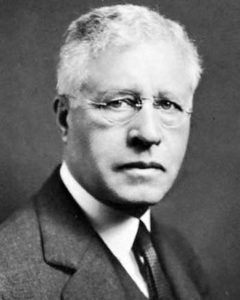
John Hope
On this date, we mark the birth of John Hope in 1868; he was a Black activist and educator.
Born in Augusta, Georgia, his mother was the daughter of an emancipated slave, and his father, James Hope, was a white-Scottish businessman. Though his father left a substantial amount of his estate to the family upon his death, they were deprived of the inheritance. After completing the eighth grade in 1881, young Hope entered Worcester Academy (Massachusetts), graduating with honors in 1890. After enrolling at Brown University that fall, Hope began to perfect his speaking skills while developing his racial consciousness. (He could pass for white but identified as black.)
He was the Orator for his graduating class in 1894, and shortly after commencement, he married Lugenia Burns. His philosophy when he entered the education field was to insist on higher learning for blacks to make a convincing case for social equality. Hope turned down an offer to teach at Tuskegee Institute and, from 1894 to 1898, instructed in Greek, Latin, and natural sciences at Roger Williams College in Nashville, TN. When this school became Morehouse College, Hope became its first Black president. W. E. B. Du Bois, with whom he had a close, lifelong friendship, shared his views.
He was the only college president to participate in the initial meeting of the Niagara Movement in 1905. This civil rights organization was founded by a group led by Du Bois and William Monroe Trotter. It was named for the "mighty current" of change the group wanted to bring about and for Niagara Falls, near the site of the first meeting. This movement led to the formation of the National Association for the Advancement of Colored People (NAACP) in 1911.
Other academic accomplishments included the presidency of Atlanta Baptist College (1906) and his 1929 appointment as president of the “new” Atlanta University. This consortium included Morehouse, Spelman College, and Atlanta University. He traveled to France to lobby for new YMCA policies regarding the treatment of Black soldiers, the prelude to a lifelong commitment to that organization’s work.
John Hope, a pioneer in developing outstanding graduate and professional programs for Black people, died in Atlanta in 1936.
Black Leaders of the Nineteenth Century.
Edited by Leon Litwack and August Meier
Copyright 1998, the University of Illinois Press
ISBN 0-252-06213-2